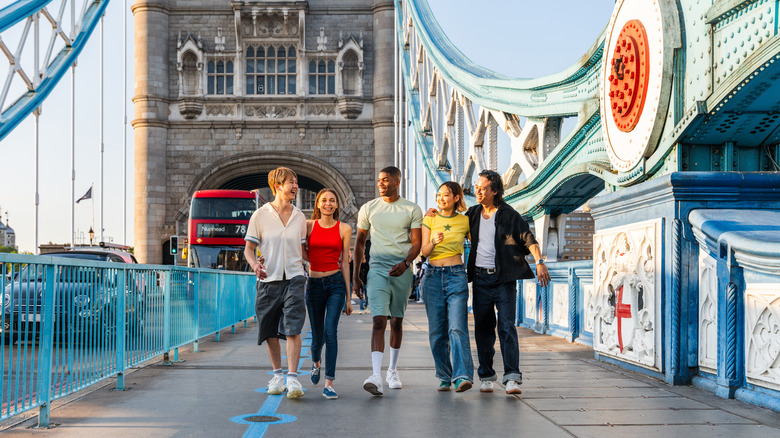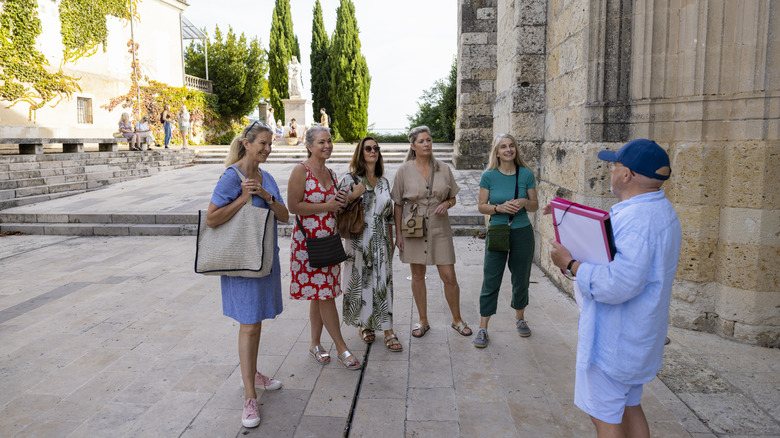The Bold Approach Rick Steves Recommends For Exploring Europe
Rick Steves has built an empire around teaching American's how to travel better. After visiting Europe for the first time with his family when he was just 14, he felt inspired by his experiences and by the ways cultures he encountered differed from his suburban life in Seattle. That first trip fostered a lifelong passion for travel that would shape the outcome of his entire life. He went on to publish multiple editions of his bestselling travel guidebooks and host a popular television series on PBS. He still spends several months of each year in Europe, and his group tours host around 30,000 travelers each year. His popularity has only continued to grow, and now he's widely considered one of the top travel experts in the world. He tends to focus on introducing travelers from the United States to European destinations, and he's full of expert advice on how to make the most out of every trip.
Some of his tips are practical and easy to implement, while others require that travelers step out of their comfort zone — even if it may feel a little awkward at first. When it comes to having the best possible experience in Europe, Steves suggests that tourists should be willing to come out of their shells in order to connect with locals.
Channel your inner extrovert when visiting Europe
Some of the richest and most rewarding travel experiences arise from the connections you'll make with other people throughout your journey, but if you're not someone who is naturally outgoing, it's easy to miss out. If you're someone who considers yourself a bit of an introvert, travel is the perfect time to step out of your comfort zone. "The meek may inherit the earth, but they make lousy travelers," Rick Steves wrote on his website. You'll have a much better time if you're willing to push yourself to interact with the local community. "Meet people. Don't wait for cultural experiences — reach out and make them happen," Steves suggests.
He recommends shopping at open-air markets as an ideal place to start interacting with locals. Markets are also a wonderful place to pick up ingredients for a picnic and enjoy some of the cheapest meals you'll eat in Europe. Initially, you may feel a bit awkward attempting to make your purchases or engage with locals. It can be challenging to understand an unfamiliar currency or to attempt a language that you aren't fluent in, but Steves believes it's worth working through that initial discomfort. It's also good to remember that most people who work at markets or other stores are used to dealing with foreign travelers. "You're not a gawky tourist who is out of your league; you're one in a thousand-year-long line of hungry travelers. You're legit," Steves reminds readers. "Stop looking at it as if you were on a stage, get out there, and risk making mistakes. Connect."
Embrace your cultural differences
There's a prevailing stereotype that Europeans don't like tourists from the United States. While it's true that some American traits can be viewed as rude in other parts of the world, most people in Europe are quite friendly with travelers. As an example, Berliners may get annoyed at tourists for taking selfies. American tourists tend to smile at strangers, which can make some European locals think they're a bit strange. However, despite the behavioral differences, most people are welcoming to travelers and try to be understanding. Experiencing different cultures is a fun experience for people traveling — and for locals. Don't be afraid to be yourself! As long as you're socially aware enough to ensure you aren't being offensive, the locals will likely be happy to have you around.
"The American casual-and-friendly social style is charming to Europeans who are raised to respect social formalities. While our slap-on-the-back friendliness can be overplayed and obnoxious, it can also be a great asset for the American interested in meeting Europeans," Rick Steves wrote on his website. "Consider that cultural trait a plus. Enjoy it. Take advantage of it." If you still find it challenging to meet people, consider attending a travelers' meet-up or book a tour with a local guide. Guided walking tours are some of the best ways to get your bearings in a new city and experience your destination from a local's point of view. Hiring a local guide is worth the splurge, according to Rick Steves.


